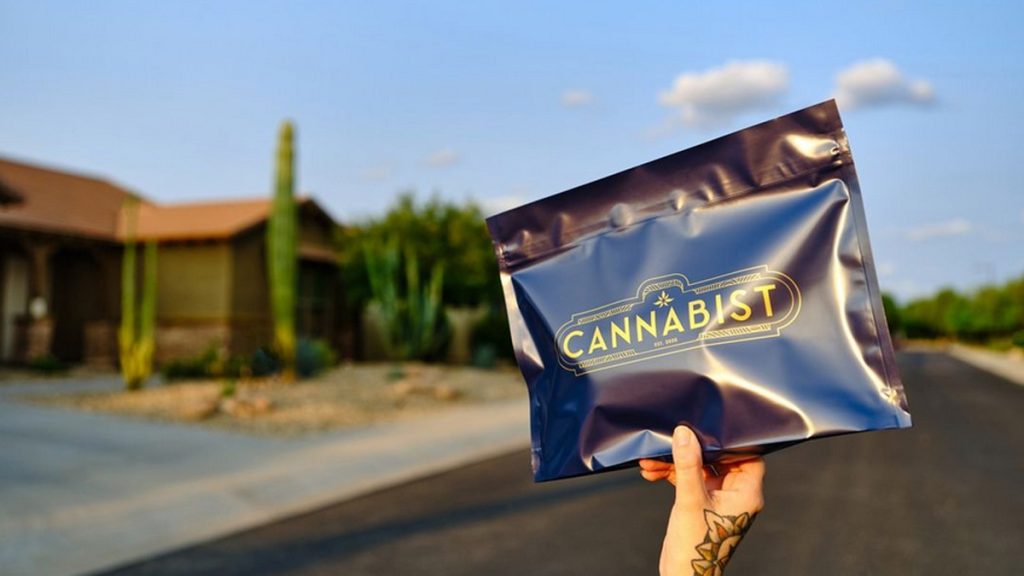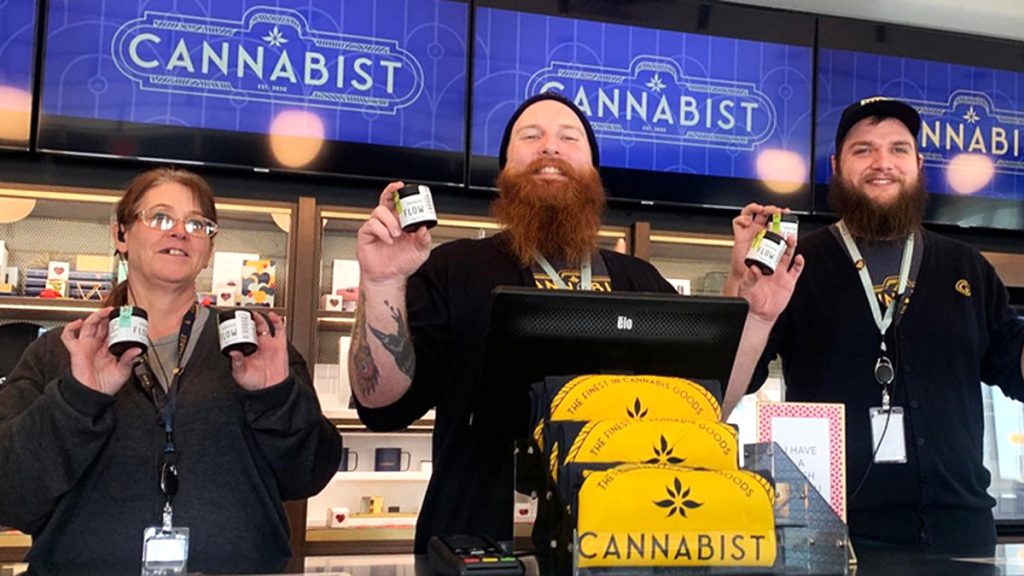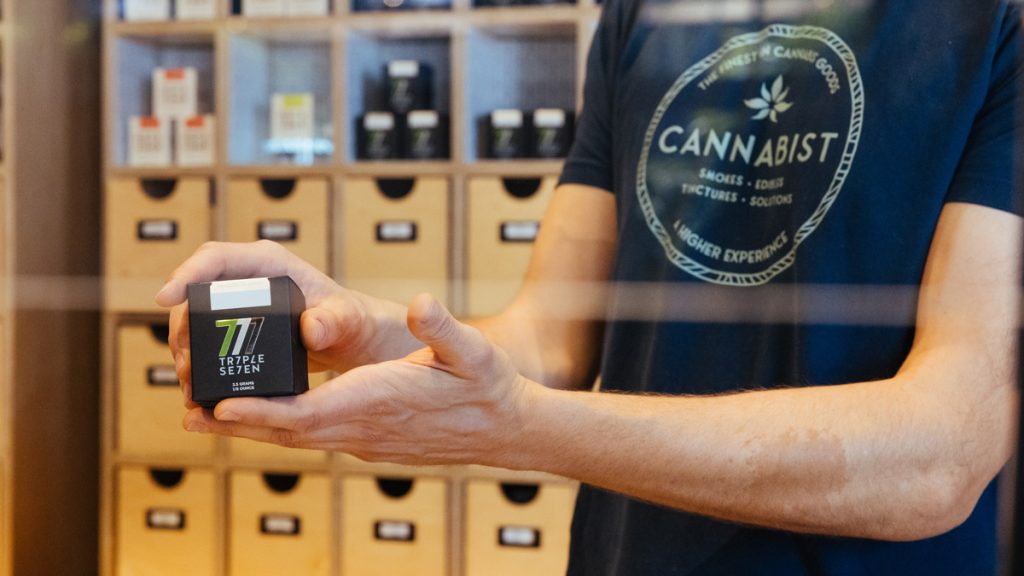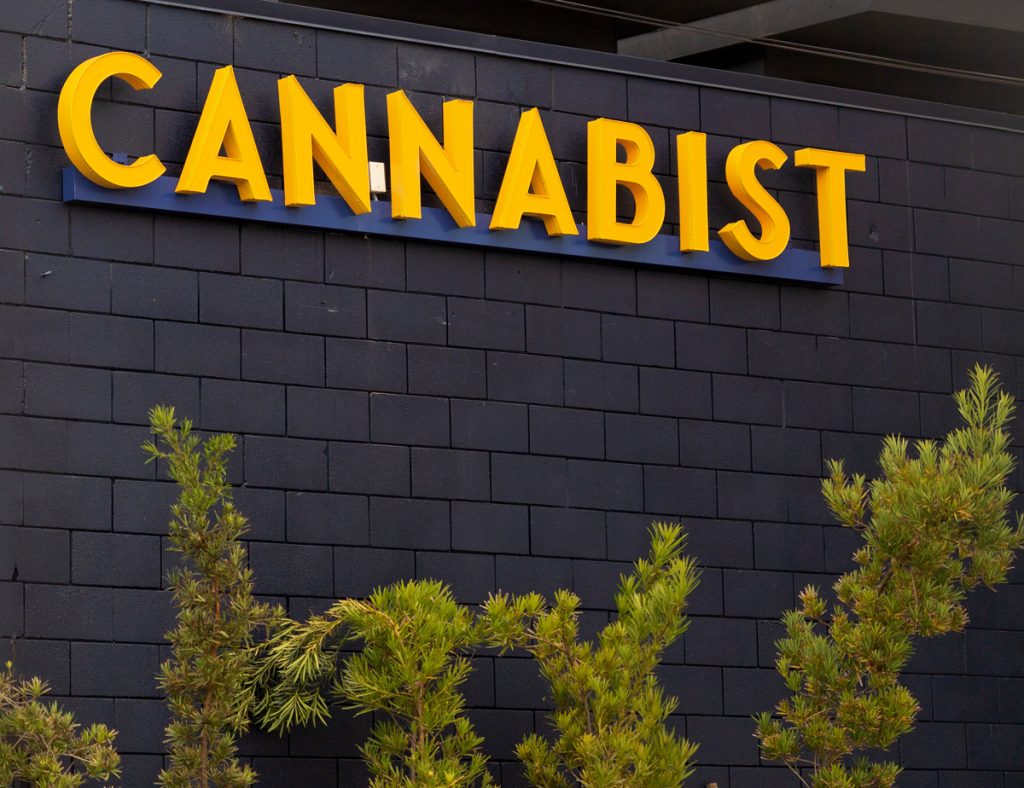Does Weed Help With PTSD? Relief & Benefits

This post is part of our Best Dispensaries in Utah series, brought to you by Cannabist Utah.
Note: The content of this article is provided for informational purposes only and is not meant as a substitute for professional medical advice, diagnosis, or treatment. Always consult your doctor or another qualified health professional before making any changes to your treatment or if you have any concerns about your mental health. Do not ignore or delay seeking professional medical advice because of something you have read here.

We know you’re dying to know, does weed help with PTSD, but before we get into the nitty-gritty, it’s important to understand what PTSD is and how it develops.
PTSD–otherwise known as Post Traumatic Stress Disorder–can arise after any type of distressing or traumatic experience. Be it in combat, a serious accident, physical or sexual assault, a near death experience–as a witness or a firsthand experiencer–there are countless ways and reasons one might suffer PTSD.
Sufferers of PTSD sometimes experience harrowing flashbacks and nightmares related to the traumatic experience, as well as heightened anxiety and obstructive, uncontrollable thoughts about the event or other potential traumatic scenarios occurring. Negative thought patterns and resulting reactionary behavior can be activated seemingly out of nowhere, but more likely to be triggered by sensory information sent to the brain, such as sounds, smells, visuals, and voices.
Because the cause of PTSD can stem from such a wide array of incidents, it comes as no surprise that nearly 1 in 13 people will develop PTSD at some point in their life. In fact, 13 million people have PTSD in a given year, and about 6% of the U.S. population alone claims to have had PTSD at some point in their lifetime. Thankfully, PTSD is treatable, and symptoms can dissipate over time with proper treatment and support.
Cognitive Behavioral Therapy (CBT) and other forms of therapy in tandem with medications to treat anxiety and depression are often given to patients diagnosed with PTSD. However, an unconventional method of treatment that has risen over the past few years is weed for PTSD, which can positively impact some PTSD patients.
Whoa, whoa, whoa, how does weed help with PTSD, exactly?
Table of Contents
Weed and PTSD
PTSD can look like always feeling tense and on guard, having an ear raised and an eye observing at all times. It can also look like difficulty concentrating due to paranoia and anxiety, and trouble falling or staying asleep. Getting frightened easily, engaging in risky or destructive behavior, and general irritability are some other ways PTSD can take form in those who suffer from a traumatic experience. It is not to be taken lightly, and it is important to handle symptoms with care. Weed won’t be every PTSD sufferer’s cup of tea.
For the skeptics who are baffled, wondering how does weed help with PTSD, let’s break it down to a science. Weed interacts with the brain and body through cannabinoid receptors. Cannabinoids–the active compounds of cannabis, which include THC and CBD–can change how the brain processes memories. This is huge because PTSD patients are triggered through their traumatic memory. Said cannabinoids work their magic on the brain’s endocannabinoid system, which is responsible for managing several other cognitive functions affected by PTSD. Regulation of stress, anxiety, and fear, are all potential byproducts of cannabis use.
Individuals with PTSD have higher accessibility to cannabinoid type 1 receptors when compared alongside those who have not suffered a traumatic experience. As a result, cannabis consumption by PTSD sufferers can yield short-term reductions in symptoms such as flashbacks, intrusive and returning thoughts of a traumatic event, anxiety, agitation, self-deprecating thoughts, and sleep deprivation as a side effect of nightmares.
One study revealed that cannabis reduced the intensity of disturbing thoughts as well as recurring thoughts of a distressing experience in PTSD patients by over 62%, and reduced flashbacks and anxiety over PTSD. There have been several studies indicating positive results when veterans of war consume cannabis to treat symptoms of PTSD.
While marijuana has the potential to enhance mood, boost esteem, and combat symptoms associated with depression, it can pose the opposite effect, in some instances exacerbating symptoms like anxiety and depression in certain patients. Negative self-perception and suicidal thoughts can be prevalent in PTSD victims, and those who experience such mental health difficulties should always consult with a medical professional before incorporating a new substance for treatment. Even if a medical professional believes marijuana can help with specific symptoms, it is crucial to check in regularly with your doctor to ensure that it is the right choice for you.
It is also important to note that symptom reductions are not going to last forever, meaning cannabis is not a long-term solution for the treatment of PTSD. Bearing that in mind, it is important to seek counseling and consult with a medical professional about all possible treatment options, and to potentially use cannabis in tandem with prescribed medications for PTSD.
Is Smoking Weed The Only Way To Consume THC for PTSD Treatment?
In summary, cannabis can help with stress and anxiety reduction, better sleep, less irritability, mood stabilization, heightened self-esteem, and even anti-inflammatory issues that can be related to autoimmune diseases, which can manifest from PTSD. Smoking cannabis is a powerful way to feel its fast acting effects on the body and mind and find relief.
Not a fan of smoking? Not a problem! PTSD relief can be found through various forms of marijuana consumption, including everything from edibles and vapes to creams and tinctures. There are topicals you can apply to the body, pre roll joints and portable vaporizers for convenience, and delicious gummies, cookies, and beverages that will help you gradually feel relief from PTSD related symptoms.
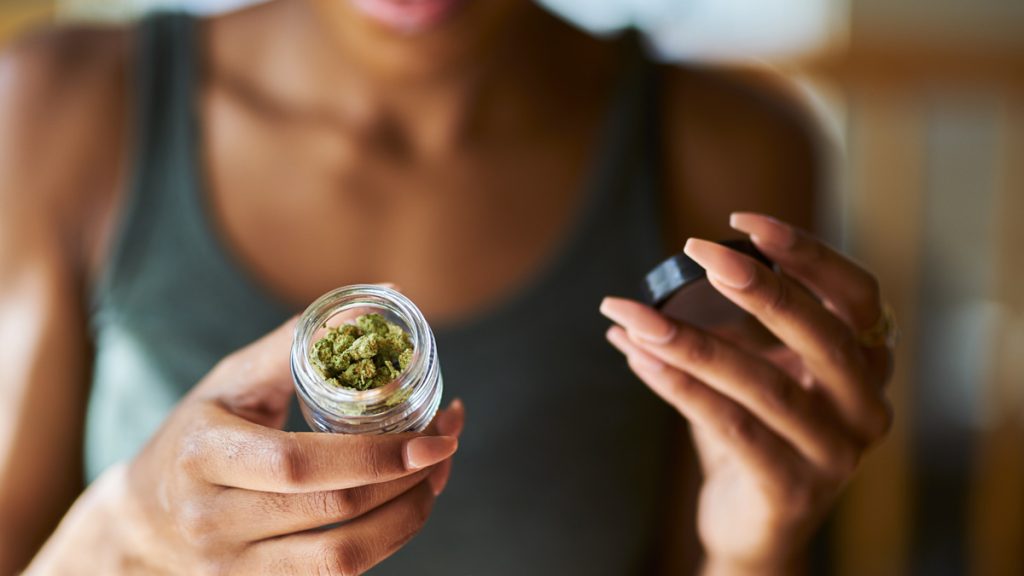
Best Strains For PTSD
The best strains to treat PTSD depend on the individual, given their specific age, tolerance, and trauma, among other factors,impact the outcome. Generally speaking, strains that are high in CBD and lower in THC are often preferred to treat PTSD patients. Since CBD doesn’t have psychoactive properties, it is a great way to feel some benefits of cannabis–such as stress and anxiety reduction–while avoiding feeling high, which can lead to paranoia and worsen anxiety in some instances. Specific strains high in CBD and low in THC include ACDC, Harlequin, Charlotte’s Web, and Ringo’s Gift.
To tackle nightmares and get a restful sleep, you may want to check out Blue Dream, which offers terpenes myrcene, pinene, and caryophyllene, producing a relaxing effect, though it is a THC heavy strain, which might not work for some people with high anxiety. An alternative could be Grand Daddy Purple, an indica-dominant strain that can also help promote relaxation and increase joy.
To diminish anxiety and apathy, and soothe the nervous system, you might check out the hybrid OG Kush–which contains large amounts of the terpenes myrcene, limonene, caryophyllene, and linalool, which can cultivate calming yet energizing feelings. It is high in THC, which might not be for everyone. A less psychoactive alternative is Cannatonic which is CBD dominant and lower in THC. Blueberry Kush could be another excellent way to help de-stress, reduce pain, and promote relaxation.
Is Sativa or Indica Better For PTSD?
So is sativa or indica better for PTSD?
This is a tough question, considering sativa strains have potential to heighten anxiety and paranoia. PTSD sufferers are typically better off with a strain that offers calming and soothing properties.
If you are experiencing nightmares and flashbacks, you’ll want to opt for indica or indica-dominant hybrid strains, which can help put you in a state of relaxation, calm the mind and body, and have sedative properties that can promote sleep. It is also thought to be a much safer, natural approach, opposed to prescribed sleeping pills, which can be dangerous and potentially lethal if not used correctly.
If you are looking for something to help you move through your day and help you stay focused, minimize mental disturbances, boost your mood, while still feeling a sense of calm, sativa might be the better option for you. Budtenders at your local dispensary can create a tailored approach for you and provide you with the right recommendations for weed products best suited for your symptoms.
How Often to Smoke Weed for PTSD?
Recommended dosages for how much weed to consume to help treat PTSD completely depend on tolerance, body weight, sensitivity levels, and other factors. Consult with your doctor and get advice from a budtender to better understand the frequency at which you should smoke weed to lessen symptoms of PTSD.
How To Purchase Marijuana
Interested in buying weed to help treat everything from PTSD and anxiety to pain and stress? Cannabist San Diego is a fabulous place to do so. Call us biased, but it may just be the best dispensary in Utah. This cutesy weed shop offers a fine selection of high quality bud at various price points–including products like vapes, pre-rolls, edible candies and cookies, as well as fresh bud.
Their amicable staff are experts in the realm of weed and can help tailor your experience based on what symptoms you may have and what you are trying to alleviate. If you are curious about treating your PTSD with marijuana, Cannabist is a great place to start–don’t hesitate to get to know your budtender and ask them all the questions you may have!

Key Takeaways On Weed And PTSD
So now that we know the answer to “does weed help with PTSD,” let’s review the “how and why does weed help with PTSD.”
- People with PTSD can potentially benefit from cannabis use to treat everything from nightmares and flashbacks to anxiety and mood imbalances
- Weed consumption might help manage brain functions associated with memory, fear, and stress
- Weed might help reduce sleep disturbances, frequency of nightmares and associated insomnia, allowing one to get adequate rest
- Marijuana is not a long-term solution for PTSD, and can worsen symptoms in some cases–so the advice of your medical professional is important
- CBD dominant strains may be best for those with anxiety, nightmares, and those feeling on-guard
PTSD may go away a few months or years after the initial trauma, but for some, symptoms can last many years, especially if they don’t go untreated. That’s why it’s important to tackle it. We hope you found this article useful in your journey to combating PTSD. There is light at the end of the tunnel, so we encourage you to consult with your doctor to determine if weed is right for you and establish which particular strains and dosages for your particular needs. There are even some brands made by veterans, like American Weed Co., that were created specifically to help alleviate symptoms associated with PTSD!
Media credits: Unless otherwise noted, images in this article are copyright of LaJolla.com.
Courtney is a San Diego-based, San Francisco bred millennial with a passion for design and self-expression. She prides herself in her charcuterie board making skills and has a soft spot for animals. When she’s not writing, you can catch her playing tennis and enjoying the diversity of events and restaurants San Diego has to offer.



